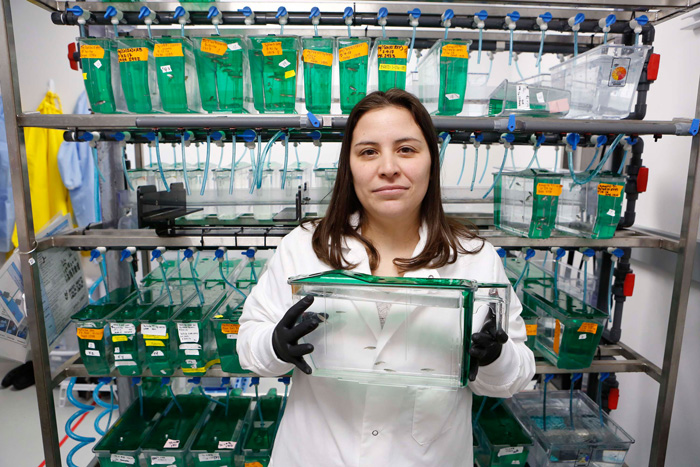UTEP Scientist Earns Coveted NIH Development Grant, Studies How Birth Defects Develop
Last Updated on February 19, 2018 at 3:55 PM
Originally published February 19, 2018
By UC Staff
UTEP Communications
The goal of Anita Quintana’s research at The University of Texas at El Paso is to try to understand what happens during development to cause children to be born with birth defects.

More specifically, she is looking at birth defects that affect neurological and craniofacial development. Quintana, Ph.D., assistant professor in the Department of Biological Sciences, begins by studying human patients that have these diseases and disorders. She combines the genetic studies conducted on these patients with developmental biology studies of zebrafish.
“That same gene or similar gene that is mutated in the human patient, we find its parallel gene in zebrafish,” Quintana said. “Then, we look to see what happens in the fish when we delete that gene or we cause a mutation in that gene. So, we hope that by studying the cells and the responses in the fish that we can understand what might be happening during human development a little bit better.”
Aside from being a compact, cost-effective option, Quintana said she works with zebrafish because they externally fertilize their eggs. That allows her to analyze development from a single cell to a complete organism, a process that takes five days.
“So, everything that happens in nine months in a human being we are seeing much more rapidly,” Quintana said. “All those mechanisms — how to form a heart, how to form a brain or kidneys — those mechanisms in the fish are very similar to what happens in a human. So, I think that zebrafish are a very powerful way to study developmental diseases.”
Quintana’s work is supported by a research scientist development award from the National Institutes of Health. The grant, known as a K01, from the NIH’s National Institute of Neurological Disorders and Stroke, is part of a cross-disciplinary research program and is worth $700,932 during a three-year period.
This is a highly significant award, said Robert Kirken, Ph.D., dean of the College of Science, and is the first of K01 grant received by a UTEP faculty member.
“This award is a testament not only to what Anita has done so far, but what she is poised to do in the future,” Kirken said. “These grants support scientists who are not only committed to research but are also identified by the NIH as young professors who should be given access to advanced laboratory training and additional experience.”